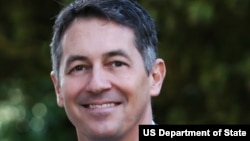The United States is increasing its efforts to decriminalize laws and end discrimination against LGBTI (lesbian, gay, bisexual, transgender and intersex) people around the world. A senior U.S. official says addressing core issues of human rights will be at the heart of this global campaign.
LGBTI issues increasingly are being discussed in a more transparent manner, with notable progress being made in some countries. A Ugandan court struck down a punitive anti-gay law last year, and Mozambique repealed its anti-gay legislation earlier this year. Just last week, the U.S. Supreme Court ruled that gay marriage in the United States is constitutional.
LGBTI people, however, continue to face discrimination and danger to their safety throughout the world. Homosexuality remains illegal in 79 countries. It carries the death penalty in eight of these nations.
Randy Berry was appointed this year as the U.S. State Department’s first special envoy for the human rights of LGBTI persons to advocate for their rights with governments worldwide. He said the Obama administration wants to convey the message that this is a core human rights issue.
“I think it is a reflection really of the administration’s belief that elevating the conversation will help us alter the global balance where, I think, we have seen some advancements and progress, but also some very, very deep concerns and some deterioration of the human rights situation in a number of countries,” Berry said.
Berry told VOA his job is to get countries to understand that harassing, torturing, jailing and, in some cases, executing people because of their sexual orientation or gender identity are neither right nor acceptable practices. He said all people should be able to live free of persecution.
“We certainly would like to see progress in terms of decriminalization of homosexuality in as many places as we can encourage that," he said, "where we can encourage greater space for civil society structures through our engagements with governments, our own direct engagement with civil society, our engagements with communities of faith or the media. My hope is that we can open up some of that space. At its heart … we are planting trees.”
Berry said LGBTI issues involve long-term appreciation for human rights and long-term social change. He said that would take many, many years in some instances.
Berry said he thought he could be particularly effective in his current position because of the understanding he brings. He said that as one of the most senior openly gay officials within the U.S. State Department, he has an understanding of the dynamics both in the United States and in the global sense.




